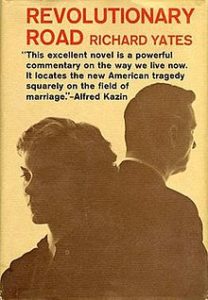By Andy Piascik
For many years Connecticut’s Fairfield County has been a place of contrasts. It has cities that, even in times of economic boom, were often places where poverty and defeat were prevalent. It has also historically been a place where the well-to-do live in towns that, beginning in the 1940s, came to be known as suburbs. Both the industrial cities and the green suburbs of Fairfield County have been the subject of much literature and Richard Yates’s 1961 Revolutionary Road is one of the best-known novels about the latter.
The novel is set mostly in 1955 and is the story of Frank and April Wheeler, a couple with two children who live on Revolutionary Road in a moderately upscale Fairfield County town.
Both Wheelers had previously lived in Manhattan and that experience informs the mixed feelings they share about their suburban town. Out of a growing unhappiness comes April’s idea to move to Paris so Frank can “find himself.”
Their neighbors and Frank’s colleagues greet the Paris idea with shock, skepticism, and resentment—resentment that their well-constructed lives in the comfortable Connecticut suburbs have not produced happiness. Events soon cause the Paris plan to unravel, heated arguments and recriminations ensue followed, ultimately, by tragedy.
Connecticut Suburbs Offer No Escape From Unhappiness
The Connecticut suburbs play a crucial role in Revolutionary Road. As it was then, and in many ways remains today, Fairfield County is held up as the ultimate badge of success for an upper-level professional family. It’s a place where problems are supposed to be absent, or at least easily solve-able. While it’s likely few ever believed that to be the case, the toll unhappiness takes is greater because of the promise.
At the same time, Revolutionary Road is not only about the empty promises of happiness in the Connecticut suburbs. Yates seems to be getting at bigger issues about something missing in the United States at the moment it had attained, within its very real self-defined limits, the best for the most. Fairfield County represented all that the country as a whole aspired to be in the 1950s, and yet the people in Revolutionary Road who live there find it is seriously lacking.
The story is still powerful and relevant today, examining the problems that are often questions of life and death and remain a blight on the American Dream. Other novels of the time set in Fairfield County cover similar ground, most notably Sloan Wilson’s The Man in the Gray Flannel Suit and Laura Hobson’s Gentlemen’s Agreement. What distinguishes Revolutionary Road is that it ends in tragedy and defeat. It is perhaps for that reason that neither the novel nor the 2008 film adaptation were particularly well-received.
Bridgeport native Andy Piascik is an award-winning author who has written for numerous publications and websites over the last four decades and is the author of several books. He can be reached at andypiascik@yahoo.com.










